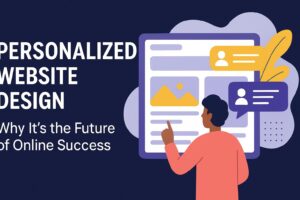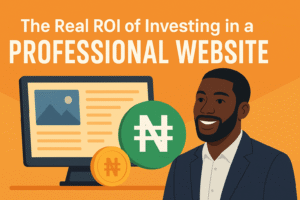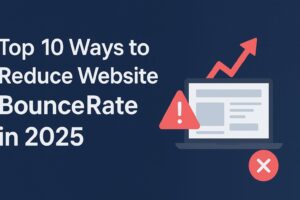Introduction
In 2025, having an online presence isn’t optional—it’s essential. But many business owners wonder: “Do I need a full website if I already have a thriving Instagram or Facebook page?” The answer is clear: you need both. In this post, we’ll explore the strengths and weaknesses of each platform and show how combining them can drive serious business growth.
Why Some Businesses Rely Solely on Social Media
Social media platforms are free, popular, and easy to set up. With tools like Instagram Shopping and Facebook Business Pages, it’s tempting to run your whole business from social apps.
However, relying only on social media has major drawbacks.
Websites vs. Social Media: A Comparison Table
| Feature | Website | Social Media Page |
|---|---|---|
| Ownership | Full control | Platform-dependent |
| Design Flexibility | Unlimited customization | Very limited |
| SEO Benefits | Google-indexed, keyword-rich | Minimal |
| Analytics | Advanced (Google Analytics) | Basic platform insights |
| Trust & Credibility | High (custom domain, HTTPS) | Lower (shared space) |
| Lead Generation | Contact forms, CTAs, popups | DMs only |
| E-Commerce Control | Total (Shopify, WooCommerce) | Limited (e.g., Instagram Shop) |
Why You Still Need a Website
1. You Own It
Unlike social media, where algorithms and rules can change overnight, your website is yours. You’re not at the mercy of outages, bans, or sudden policy shifts.
2. Search Engine Visibility
People search for businesses on Google—not on Instagram. A properly optimized website boosts your discoverability.
Use tools like Google Search Console to track performance.
3. Branding and Trust
A website gives you room to tell your story, showcase testimonials, and display a professional brand. It builds credibility.
4. Advanced Features
From appointment bookings to payment gateways, blogs, and email list integration—a website can do what social pages simply can’t.
5. Better Conversion Tools
You can use landing pages, A/B testing, analytics, and conversion funnels to optimize performance.
Why You Still Need Social Media
1. Audience Engagement
It’s where your audience spends time. Use platforms like Instagram, LinkedIn, and TikTok for daily engagement.
2. Content Distribution
Promote your blogs, product launches, and updates to a wider audience.
3. Social Proof
Likes, shares, and reviews act as public trust signals.
4. Cost-Effective Advertising
Use tools like Meta Ads Manager or TikTok Ads to target specific demographics.
How to Make Them Work Together
Link Your Website on Your Bio and Posts
Example: “Click the link in our bio to book a free consultation.”
Use Facebook Pixel or Meta Tags
Track conversions from social media to your website.
Cross-Promote Content
Share blog snippets or lead magnets on your social channels.
Embed Social Feeds on Your Website
Tools like Elfsight let you embed your Instagram feed on your homepage.
Collect Emails from Social Media
Use lead magnets and newsletters to build a contact list you own.
Final Thoughts
Don’t fall into the trap of choosing between a website and social media. The most successful businesses in 2025 use both strategically. A website builds trust, scales your brand, and gives you control. Social media connects you with people in real-time and amplifies your voice.
Ready to build a stunning, high-converting website that works with your social media strategy? Let’s talk.



